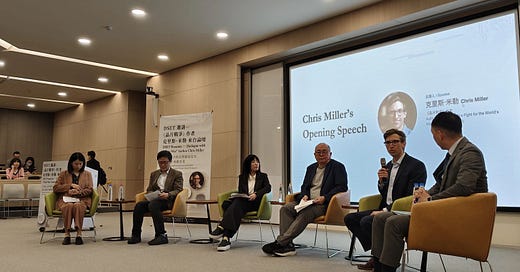Taiwan’s tech policy think tank Center for Technology, Democracy, and Society Studies (DSET) held a public forum on March 25, with Professor Chris Miller of Tufts University, author of Chip War, to share insights on U.S.-Taiwan semiconductor cooperation during Trump’s second term.
The event also featured remarks by National Security Council Advisor Li Yu-jie and included a panel discussion with four veteran Taiwanese semiconductor industry journalists: Chen Liang-rong, Editor-at-Large of CommonWealth Magazine; Ting-fang Cheng, correspondent for Nikkei Asia; Lin Hong-da, Deputy Editor-in-Chief of Business Weekly; and Lee Wen-yi, Taiwan tech industry reporter for Reuters.
In his opening remarks, Chris Miller discussed key issues during Trump’s second term: tariffs, export controls, and security defense measures. Over the past two months, Trump’s administration has doubled average tariff rates on China while imposing tariffs on other countries. Miller predicted that these policies would lead to significant shifts in global trade structures and semiconductor supply chains. He urged prompt dialogue between Taiwanese government officials and enterprises to address changes in international technological geopolitics.
Keynote Speech Takeaways
Semiconductors as a Geopolitical Linchpin:
Miller emphasized that semiconductors are central to U.S.-Taiwan relations, intertwining trade, technology, and security in ways unprecedented in recent decades. He described this moment as one of the most critical junctures in U.S.-Taiwan relations over the past half-century.
The semiconductor industry’s increasing politicization was highlighted, with Miller noting that it is now deeply enmeshed in global power dynamics, making it inseparable from broader geopolitical considerations.
Trump Administration’s Aggressive Trade Policies:
Miller discussed the Trump administration’s use of tariffs as a policy tool, noting that tariffs on China have doubled in Trump’s second term. He cautioned that such shifts in global trade regimes could have significant implications for Taiwan, given its trade-dependent economy and deep integration into U.S. supply chains.
He also raised concerns about potential future tariffs on Taiwan, emphasizing the need for proactive dialogue to mitigate risks.
U.S.-China Technology Rivalry:
The escalating tech competition between the U.S. and China was identified as a major challenge, particularly in areas like export controls on advanced semiconductors and restrictions on cloud computing access. These policies could create friction between Taiwanese companies and U.S. regulations.
Miller underscored the importance of Taiwan navigating these challenges carefully to maintain its position in global supply chains.
Security and Defense Implications:
The Trump administration’s push for allies to increase defense spending was highlighted as a potential source of pressure on Taiwan. Miller suggested that discussions on trade, technology, and security are increasingly intertwined, requiring Taiwan to manage complex diplomatic negotiations.
He warned that Taiwan must prepare for “hard-edged diplomacy” from the U.S., which may adopt a transactional approach focused on leveraging power imbalances.
The Politicization of the Chip Industry:
Miller noted that the semiconductor industry is more politicized now than ever before, with companies needing to navigate complex geopolitical landscapes. He stressed that managing this new reality will be a significant challenge for both Taiwan and the U.S..
Panel Discussion Takeaways
Impact of Trump 2.0 on Taiwan’s Semiconductor Industry:
Panelists explored how Trump’s policies have reshaped global semiconductor supply chains. While Taiwanese firms initially benefited from shifts away from Chinese manufacturing during Trump’s first term, concerns were raised about Trump’s rhetoric accusing Taiwan of “stealing” the chip industry from the U.S..
Miller reassured that such statements are largely political posturing but warned that Taiwan must remain vigilant against potential policy changes that could disrupt its industry.
China’s Technological Ambitions:
The panel discussed China’s focus on developing mature chips and DRAMs for applications like humanoid robots, which do not require cutting-edge technology. This strategy could increase competition for Taiwanese firms specializing in mature nodes.
Concerns were raised about China’s localization efforts, including attempts to build its own lithography machines and vertically integrate its semiconductor supply chain. Miller acknowledged China’s progress but noted significant technical hurdles remain.
TSMC’s Role in U.S.-Taiwan Relations:
TSMC’s growing investment in Arizona was seen as a symbol of continuity across multiple U.S. administrations. However, panelists emphasized that most of TSMC’s production capacity remains in Taiwan, underscoring its central role in global supply chains.
The $100 billion investment announcement by TSMC was highlighted as a testament to its strategic importance but also as a reminder of Taiwan's reliance on maintaining strong international partnerships.
Future Challenges for Taiwan by 2030:
Panelists speculated on how Taiwan’s semiconductor industry might evolve by 2030 amidst heightened geopolitical tensions and technological competition. They stressed the need for Taiwan to diversify markets, enhance cybersecurity resilience, and strengthen alliances with like-minded nations.
Miller urged Taiwanese stakeholders to engage in proactive dialogue with both domestic and international partners to navigate these uncertainties effectively.
These discussions underscore the intricate interplay between semiconductors, geopolitics, and economic policies shaping U.S.-Taiwan relations amidst global technology competition.



